Letters to the Editor: Standardized tests are oppressive. Kudos to UC for abandoning them

- Share via
To the editor: Cheers to the University of California system for abandoning admissions exams like the SAT and ACT. Anyone who creates a test knows the answer before writing the question, so all tests have bias. Some students are really good test takers; others are not. (“UC dumped college entrance exams. Big mistake,” editorial, Dec. 1)
High school grades are a much better basis for college admittance, but there are other factors that should be considered.
In my 35-year career at Mt. San Antonio College (a community college), I had experience with many kinds of students. For some, high school was a disaster because of a variety of personal challenges. In community college, many of these students became very successful, even campus leaders.
If an admission test had been in place at the community college level, these students never would have made it. Yet many of them went on to win scholarships and other academic awards.
It is the truly motivated, sincere student who succeeds in college. SAT or ACT scores do not measure maturity, drive, persistence or self discipline, the important qualities that lead to college graduation and good careers.
Phyllis Specht, Pasadena
..
To the editor: Before making this change, UC might want to review how many of the students admitted previously with test scores would still be admitted without test scores, and how many students rejected would be admitted without standardized test scores.
Most important is how many students the UC system graduates who can compete globally with other college graduates from countries that still use testing for university admission.
Lowering the threshold for college admission does not make us more competitive. It’s like public schools lowering the requirement for a passing grade and graduation. It harms the student.
Andrew Ko, San Marino
..
To the editor: The Times Editorial Board is wrong in its argument for the SAT, or any standardized assessment, to act as an objective metric for student matriculation to college.
The deeper problem is that the entire system itself is biased against socio-economically disadvantaged students, as measured by decades of standardized assessments, most notably the National Assessment of Educational Progress.
The truth is, there are more effective and accessible ways of instructing and assessing, such as active and problem-based learning, and performance and portfolio assessments. These also lead to deeper levels of understanding and more robust and well-rounded learning results.
They are not practiced because, as The Times’ editorial shows, the myth of objectivity in tests, and the belief that shallow recall is learning, are deeply rooted in the system.
Dain Olsen, Los Angeles
The writer is a media arts specialist and teacher in the Los Angeles Unified School District.
..
To the editor: I have three children, all of whom are now successful adults. All of them took the SAT and ACT college entrance exams, and all of them scored acceptably well according to their talents.
Despite their test scores, all of them graduated college with honors. There was no correlation between how well or poorly they did on their tests and their ultimate academic success.
This editorial has it exactly backward. The big mistake was not eliminating these tests long ago.
Bill Waxman, Simi Valley
More to Read
A cure for the common opinion
Get thought-provoking perspectives with our weekly newsletter.
You may occasionally receive promotional content from the Los Angeles Times.









